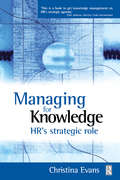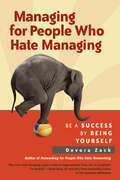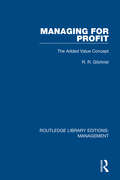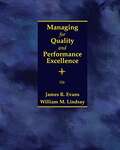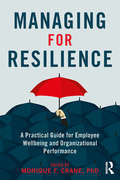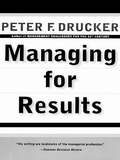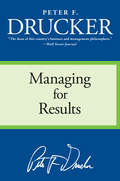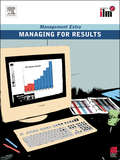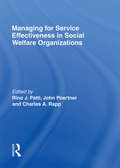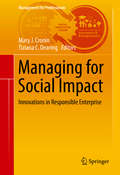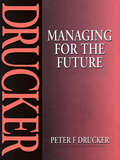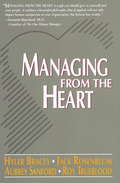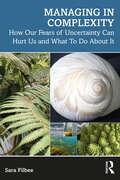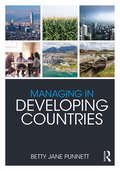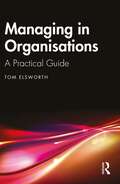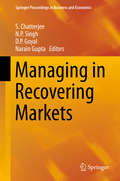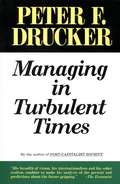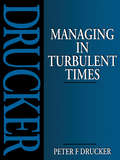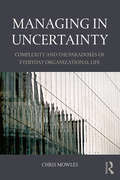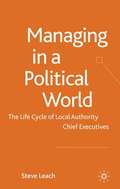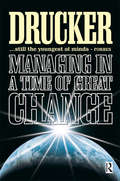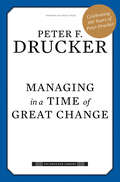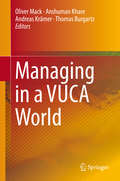- Table View
- List View
Managing for Knowledge - HR's Strategic Role: Hr's Strategic Role
by Christina EvansWhilst there are many books on knowledge management there are few aimed directly at HR practitioners and the critical role that they can play in building a knowledge-centric culture. This practical book draws on the author's own experience, as well as that of leading-edge Human Resource and Knowledge Management practitioners (including Linda Holbeche, Elizabeth Lank, and David Snowden), each of whom recognise that building a knowledge-centric culture cannot be achieved through technology alone. It covers areas such as: * Defining the key ingredients of a knowledge-centric culture* The changing structures, roles and responsibilities needed to create a knowledge-centric culture * HR's unique contribution to building a knowledge-centric culture, together with practical steps for getting started on the KM journey and for keeping the momentum going * Tools and techniques for: opening up a dialogue about why knowledge management is crucial for business and personal success; knowledge mapping; encouraging and facilitating knowledge sharing, as well as ways of identifying key knowledge players * How to help your organisation reframe its assumptions about learning in the knowledge economy * How to ensure that your HR practices are knowledge aligned
Managing for Organizational Integrity
by Lynn Sharp PaineEthics is as much an organizational as a personal issue. Managers who fail to provide leadership and institute systems that facilitate ethical conduct share responsibility with those who knowingly benefit from corporate misdeeds. Executives who ignore ethics run the risk of personal and corporate liability. In addition, they deprive their organizations of the benefits available under new federal guidelines that recognize for the first time the organizational and managerial roots of unlawful conduct and base fines partly on the extent to which companies have taken steps to prevent that misconduct. An integrity-based approach to ethics management combines a concern for the law with an emphasis on managerial responsibility for ethical behavior. When integrated into the day-to-day operations of a company, such strategies can help prevent damaging ethical lapses, while tapping into powerful human impulses for moral thought and action.
Managing for People Who Hate Managing: Be a Success By Being Yourself
by Devora ZackProfessional success, more often than not, means becoming a manager. Yet nobody prepared you for having to deal with messy tidbits like emotions, conflicts, and personalities—all while achieving ever-greater goals and meeting ever-looming deadlines. Not exactly what you had in mind, is it? Don't panic. Devora Zack has the tools to help you succeed and even thrive as a manager. Drawing on the Myers-Briggs Type Indicator, Zack introduces two primary management styles—thinkers and feelers—and guides you in developing a management style that fits who you really are. She takes you through a host of potentially difficult situations, showing how this new way of understanding yourself and others makes managing less of a stumble in the dark and more of a walk in the park. Her enlightening examples, helpful exercises, and lifesaving tips make this book the new go-to guide for all those managers looking to love their jobs again.
Managing for Profit or for Longevity: Is There a Choice?
by Arie De GeusThis chapter discusses how effective corporate management entails treating institutions like living ecosystems - with the recognition that they will live or die according to the same natural laws that govern human growth and development.
Managing for Profit: The Added Value Concept (Routledge Library Editions: Management)
by R. R. GilchristIn this book, first published in 1971, the author develops and tests a productivity system based on Added Value as the measure of company income and output. The theory behind the system is that the behaviour of a company can best be explained in terms of its need to create an income. From this, it follows that its effectiveness depends on the efficiency with which it uses all the resources at its disposal to create this income. If it is accepted that the need is to create an income, then the efforts of the employees, the objectives of individuals, the pricing procedures, and the control systems must be co-ordinated to achieve this end. This title will be of interest to students of management, economics, and business studies.
Managing for Quality and Performance Excellence
by James R. Evans William M. LindsayPacked with current examples, cases, and illustrations, market-leading MANAGING FOR QUALITY AND PERFORMANCE EXCELLENCE, 10e focuses on the fundamental principles of total quality and emphasizes high-performance management practices, such as those reflected in the Baldrige Criteria. Written by experienced leaders in the fields of performance management and quality, the text delivers the definitive resource for coverage of ISO 9000 certification, Six Sigma, and the U.S. Malcolm Baldrige National Quality Award standards. A wealth of current examples from leading organizations throughout the world reflects quality as they emphasize the practical aspects of the book's managerial focus and pertinent technical topics. You can efficiently prepare to become an ASQ Certified Quality Manager, as this edition covers most of the Body of Knowledge required for ASQ certification. It's everything you need -- now and throughout your career -- to ensure quality management success.
Managing for Resilience: A Practical Guide for Employee Wellbeing and Organizational Performance
by Monique F. CraneIn an era of longer hours and shorter contracts, of tighter margins and frequent organizational change, stress can undermine both the mental health and performance of employees. A culture of resilience in the workplace, however, offers the potential to support psychological wellbeing and improve the performance of both people and organizations. This is the first book to provide managers with a guide to fostering psychological resilience within their teams. It synthesises not only the latest cutting-edge research in the area, but also translates this into practical advice for a range of organizational settings. Chapters cover the following important issues: Key personality factors related to resilience How job design and routines can improve employee resilience How to build a resilient team Communicating change and improving teamwork Modelling resilient thinking and behaviour as a leader Selecting the right resilience training for your organisation This is the ideal book for anyone interested in fostering a high-performance and emotionally resilient workforce, whether they are a manager, HR professional or occupational psychologist. Its cutting edge approach will also make it important reading for students and researchers of organizational and occupational psychology.
Managing for Results
by Peter DruckerThis is a "what to do" book. It deals with the economic tasks that any business has to discharge for economic performance and economic results. It attempts to organize these tasks so that executives can perform them systematically, purposefully, with understanding, and with reasonable probability of accomplishment. It tries to develop a point of view, concepts and approaches for finding what should be done and how to go about doing it. This book draws on practical experience as a consultant to businesses of all kinds and sizes for a good many years. Everything in it has been tested and is being used today effectively in real businesses. There are illustrations of, and references to, concrete situations on almost every page-
Managing for Results
by Peter F. DruckerThe effective business, Peter Drucker observes, focuses on opportunities rather than problems. How this focus is achieved in order to make the organization prosper and grow is the subject of this companion to his classic work, The Practice of Management. Managing for Results shows what the executive decision maker must do to move his enterprise forward. Drucker again employs his particular genius for breaking through conventional outlooks and opening up new perspectives for profits and growth.
Managing for Results Revised Edition: Revised Edition (Management Extra Ser.)
by ElearnStuck for ideas, inspiration or just want to work differently? Management Extra brings all the best management thinking together in one package. The books are practical and well structured to provide an in depth treatment of these management topics. Titles in the series: * Business Environment * Change Management * Development for High Performance * Effective Communications * Financial Management * Information and Knowledge Management * Leadership and Management in Organisations * Leading Teams * Making Sense of Data and Information * Managing Markets and Customers * Managing for Results * Managing Health, Safety and Working Environment * Managing Legal and Ethical Principles * Managing Yourself * Positive Working Relationships * Project Management * Quality and Operations Management * Reaching Your Goals Through Innovation * Recruitment and Selection * Reputation Management The series fuses key theories and concepts with applied activities to help managers examine how they work in practice. The books are created with individuals in mind. They are designed to help you improve your management skills. Management Extra can also be used in conjunction with management programmes of study aligned to standards. Each of the books has case studies, self assessments and activities all underpinned by knowledge and understanding of the frameworks and techniques required to improve performance. Management Extra provides managers and trainers with a handbook for action and development. "You found it – what a find! A practical resource packed with all the relevant theory and suggested activities to support your professional development. An essential resource to have at your fingertips, jump in and enjoy."--Russell Jeans, Learning and Development Manager, ntl "All the essential concepts are here, presented in an easily digestible format with lots of up to date case studies and references – but, most importantly, with plenty of thought provoking activities and self-diagnostic exercises to make the learning personal and transferable."--Peter Manning, Head of Training & Development, News International Newspapers Ltd
Managing for Service Effectiveness in Social Welfare Organizations
by John Poertner Rino J Patti Charles A RappThis important book is the first to make an explicit link between management practices and service outcomes in social welfare agencies. Managing for Service Effectiveness in Social Welfare Organizations is based on the premise that the primary responsibility and distinctive competency of social welfare management is delivering high quality, effective services to clients. Collectively, the book’s esteemed contributors have clearly presented a model of administration founded on concepts and strategies for connecting managerial action with service effectiveness. The sections of the book correspond to the core functions and tasks in an effective approach to management, including measuring performance, program and organizational design, managing people, managing information, managing environmental relations, and the ethics of managing for effectiveness.
Managing for Social Impact
by Mary J. Cronin Tiziana C. DearingThis book presents innovative strategies for sustainable, socially responsible enterprise management from leading thinkers in the fields of corporate citizenship, nonprofit management, social entrepreneurship, impact investing, community-based economic development and urban design. The book's integration of research and practitioner perspectives with focused best practice examples offers an in-depth, balanced analysis, providing new insights into the social issues that are most relevant to organizational stakeholders. This integrated focus on sustainable social innovation differentiates the book from academic research monographs on stakeholder theory and practitioner guides to managing traditional Corporate Social Responsibility (CSR) programs. Managing for Social Impact features 15 contributed chapters written by thought leaders, industry analysts, and managers of global and local organizations who are engaged with innovative models of sustainable social impact. The editors also provide a substantive introductory chapter describing a new strategic framework for enhancing the Return on Social Innovation (ROSI) through four pillars of social change: Open Circles, Focused Purpose Sharing, Mutuality of Success, and a Persistent Change Perspective.
Managing for the Future
by Peter DruckerThis wide-ranging, future-oriented book is sure to number among the most important and influential business books of the decade. Drucker writes with penetrating insight about the critical issues facing managers in the 1990s: the world economic order; people at work; new trends in management and the governance of organizations.
Managing from the Heart
by Aubrey Sanford Roy Trueblood Hyler Bracey Jack RosenblumFrom the profit-minded managers who make up the brain trust at The Atlanta Consulting Group comes a simple new method hailed as a revolutionary management practice: learning to care.From the Trade Paperback edition.
Managing in Complexity: How Our Fears of Uncertainty Can Hurt Us and What To Do About It
by Sara FilbeeChallenging traditional ways of thinking, leading, and managing based on cutting-edge research and real-world examples, this book provides an insightful and accessible perspective for leaders and managers in the 21st century who seek to become more effective in an increasingly uncertain and complex world which limits their ability to get results. Just how significant this is has become all too evident in the Covid-19 pandemic. Many books have been written to address these leadership and management challenges, but they are based on the premise that there are ways to simplify, organise, and control what is going on in the workplace. In our complex world this is not possible, and there are no magic tools and techniques that will ensure success. This book explains why and offers an alternative approach, incorporating social theory and the sciences of uncertainty, written in plain English by a leader with over 40 years of experience in the private, not-for-profit, and federal government sectors. Each chapter focuses on a single key concept and is introduced by a story illustrating how these key ideas can be applied in the workplace and includes practical suggestions for leaders and managers at all levels and across sectors to incorporate these perspectives into their day-to-day work practice, making it easy for readers to use the book as a reference guide. All who manage in complex times and uncertain environments will appreciate this accessible and actionable book that will inspire a radical rethink of current management orthodoxy and help them to become more effective.
Managing in Developing Countries
by Betty Jane PunnettThis book considers management theories and approaches specifically in the context of developing countries. In recent years, international business scholarship has increased its focus on the developing world, which represents 80 percent of the global population and has doubled its share of value-added trade in the past two decades. This text will help readers to manage successfully in this region by learning to assess, apply, and adapt established practices in developing countries. Punnett begins by identifying the characteristics of the developing world—Africa, Asia, the Caribbean, India, Latin America, and the Middle East—and the companies therein to help students understand how the reality of these countries influences business and management. By tracking a fictional product through the internationalization process, students will navigate the challenges of operating an international company from a developing country base, using a traditional model of management focused on planning, organizing, staffing, leading, and controlling. They will also gain insight into ethical considerations likely to arise, such as differential treatment based on personal characteristics and age dispersion. Cases, discussion questions, personal stories, and end-of-chapter exercises will help readers to grapple with issues and test their learning. Complete with chapter objectives and "Lessons Learned" boxes to facilitate understanding, Managing in Developing Countries is an excellent supplement for international business or international management students with a special interest in the developing world.
Managing in Organisations: A Practical Guide
by Tom ElsworthManaging in Organisations is a concise, accessible, and practical approach to the difficult job of line management. It offers a kit of management tools and a range of worked examples that can be used to address the key tasks that managers face in the workplace. This book provides clear insights into how people behave everyday in real organisations. The fundamentals of key theories and sources are covered throughout for those coming to the subject for the first time. Topics covered include individual, group, and team organisational behaviour; organisational culture and diversity; supervision and leadership; organisational design; management and change; and governance. This book considers small and larger enterprises as well as public, private, and third sectors. Short cases link the issues in the chapter and provide opportunities for developing skills and discussion. This book provides an introduction to the world of managing in organisations and is suitable for those who study organisational behaviour, organisational studies, management, and human resource management. It will also be very useful to the entrepreneur planning a small start‑up and to the busy manager of a small‑ or medium‑sized enterprise seeking to understand how best to manage the organisation for performance.
Managing in Recovering Markets
by S. Chatterjee N. P. Singh D. P. Goyal Narain GuptaThe changing dynamics of business worldwide have led organizations to look beyond traditional managerial practices while at the same time attempting to retain their core competitive advantages. This development has called upon academicians and practitioners alike to reassess the different aspects of business management such as macroeconomic variables, the nature of the market, the changing features of the workplace, the new work ethos, and/or employer-employee exchanges. In this context, the book provides essential insights on industry innovations, academic advances and policy movements with regard to recovering markets in India and around the globe. The individual papers highlight potential avenues that could allow industry to better understand and respond to the global crisis. The book collects research papers presented at the Global Conference on Managing in Recovering Markets (GCMRM), held in March 2014. Seven international and 120 national business schools and management universities were represented at the conference, the first in a series of 13 planned under the GCMRM agenda for 2014-17. The book includes more than 30 research papers chosen from a pool of 118 presented at the conference, all of which have undergone a rigorous blind review process.
Managing in Turbulent Times
by Peter DruckerFuture management advice to practitioners and business students from a professor, reporter, and philosopher.
Managing in Turbulent Times: Management: Revised Edition, Management Challenges For The 21st Century, Managing In Turbulent Times, And The Practice Of Management
by Peter DruckerManaging in Turbulent Times tackles the key issues facing managers in the 1990s: how to manage in rapidly changing environments. This seminal and prophetic book laid the foundation for a generation of writers on change management. This book concerns the immediate future of business, society and the economy. The one certainty about the times ahead, says Drucker, is that they will be turbulent times. In turbulent times the first task of management is to make sure of the organizations capacity for survival, to make sure of its structural strength and soundness, its capacity to survive a blow, to adapt to sudden change and to avail itself of new opportunities.The author is concerned with action rather than understanding, with decisions rather than analysis. It aims at being a practical book for the decision maker, whether in the private or the public sector.
Managing in Uncertainty: Complexity and the paradoxes of everyday organizational life
by Chris MowlesThe reality of everyday organizational life is that it is filled with uncertainty, contradictions and paradoxes. Yet leaders and managers are expected to act as though they can predict the future and bring about the impossible: that they can transform themselves and their colleagues, design different cultures, choose the values for their organization, be innovative, control conflict and have inspiring visions. Whilst managers will have had lots of experiences of being in charge, they probably realise that they are not always in control. So how might we frame a much more realistic account of what’s possible for managers to achieve? Many managers are implicitly aware of their messy reality, but they rarely spend much time reflecting on what it is that they are actually doing. Drawing on insights from the complexity sciences, process sociology and pragmatic philosophy, Chris Mowles engages directly with some principal contradictions of organizational life concerning innovation, culture change, conflict and leadership. Mowles argues that if managers proceed from the expectation that organizational life as inherently uncertain, and interactions between people are complex and often paradoxical, they start noticing different things and create possibilities for acting in different ways. Managing in Uncertainty will be of interest to practitioners, advanced students and researchers looking at management and organizational studies from a critical perspective.
Managing in a Political World
by Steve LeachSteve Leach identifies the key challenges facing chief executives in British local government in operating in an environment where party politics is a dominant force. It discusses the basis on which chief executives apply for posts and manage the interview process, and the importance of the 'honeymoon period' - the first 6-9 months.
Managing in a Time of Great Change
by Peter Drucker'It is not so very difficult to predict the future. It is only pointless...what is always far more important are fundamental changes that happened though no one predicted them or could possible have predicted them.' (quote taken from this book)It is these unpredictable and irreversible changes from the past, and their effect on the role of the executive which Peter Drucker examines in his latest book. The management of change is a subject which has been, undoubtedly, the principal preoccupation of management thinkers in the 1990s. Peter Drucker, the guru's guru, brings together a group of his own original essays and interviews on this vitally important topic. As ever, he provides invaluable food for thought for all executives and students of business and management.
Managing in a Time of Great Change
by Peter Ferdinand DruckerFor more than half a century, Peter F. Drucker's landmark essays have inspired and educated managers--and influenced the nature of business. Now, the learning continues with the Harvard Business Press release of the new Drucker Library Series.In Managing in a Time of Great Change, the first book in the series, Drucker offers advice to executives for thriving in the global business environment of the future, covering such topics as team building, cutting costs in retail, changes in the U.S. economy, and doing business in Japan.
Managing in a VUCA World
by Oliver Mack Anshuman Khare Andreas Krämer Thomas BurgartzThis book examines volatility, uncertainty, complexity and ambiguity (VUCA) and addresses the need for broader knowledge and application of new concepts and frameworks to deal with unpredictable and rapid changing situations. The premises of VUCA can shape all aspects of an organization. To cover all areas, the book is divided into six sections. Section 1 acts as an introduction to VUCA and complexity. It reviews ways to manage complexity, while providing examples for tools and approaches that can be applied. The main focus of Section 2 is on leadership, strategy and planning. The chapters in this section create new approaches to handle VUCA environments pertaining to these areas including using the Tetralemma logics, tools from systemic structural constellation (SySt) approach of psychotherapy and organizational development, to provide new ideas for the management of large strategic programs in organizations. Section 3 considers how marketing and sales are affected by VUCA, from social media's influence to customer value management. Operations and cost management are highlighted in Section 4. This section covers VUCA challenges within global supply chains and decision-oriented controlling. In Section 5 organizational structure and process management are showcased, while Section 6 is dedicated to addressing the effects of VUCA in IT, technology and data management. The VUCA forces present businesses with the need to move from linear modes of thought to problem solving with synthetic and simultaneous thinking. This book should help to provide some starting points and ideas to deal with the next era. It should not be understood as the end of the road, but as the beginning of a journey exploring and developing new concepts for a new way of management.
